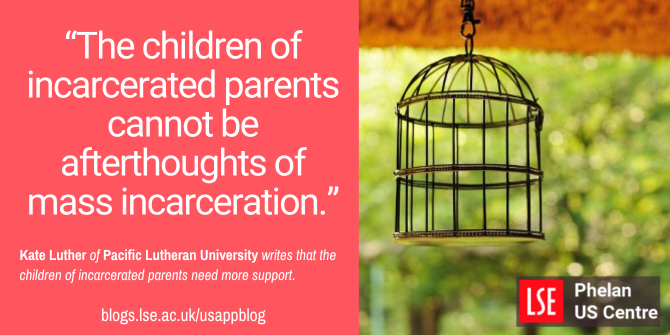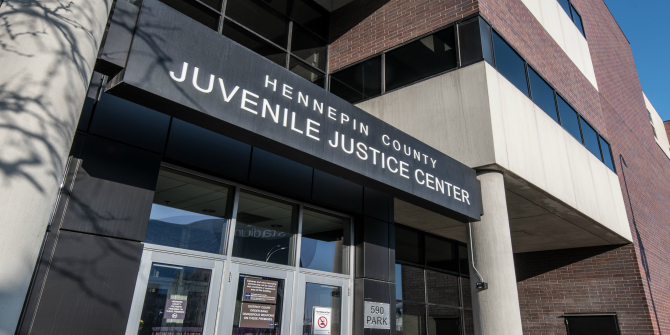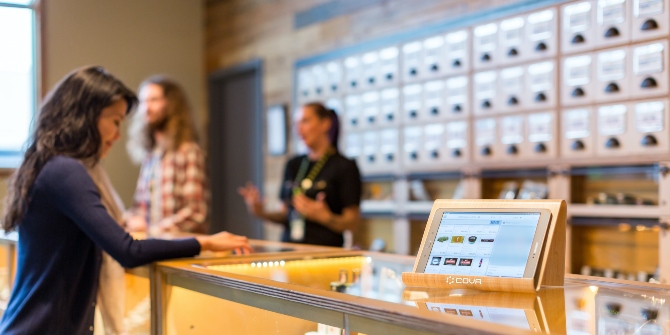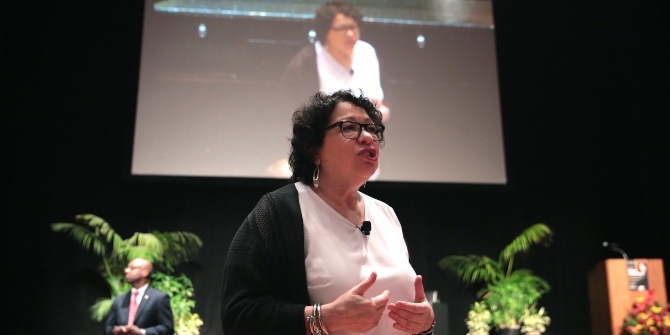 The impact of mass incarceration extends beyond incarcerated individuals to their families. When parents are incarcerated, the process can disrupt their children’s lives, with children experiencing changes in living arrangements and caregivers, precarious financial situations due to the absence of parental income, and feelings of loss. Kate Luther argues that we must view the children of incarcerated parents as the hidden victims of mass incarceration. She suggests that criminal justice reforms to benefit children could include alternatives to incarceration for parents and greater investment in their post-incarceration reentry.
The impact of mass incarceration extends beyond incarcerated individuals to their families. When parents are incarcerated, the process can disrupt their children’s lives, with children experiencing changes in living arrangements and caregivers, precarious financial situations due to the absence of parental income, and feelings of loss. Kate Luther argues that we must view the children of incarcerated parents as the hidden victims of mass incarceration. She suggests that criminal justice reforms to benefit children could include alternatives to incarceration for parents and greater investment in their post-incarceration reentry.
Mass incarceration has increased the number of children whose parents are incarcerated; in 1980 around 500,000 children had a parent in jail or prison and by 2012 this number increased to 2.6 million. It is estimated that approximately seven percent of children in the United States have experienced the incarceration of a residential parent in jail or prison. Parental incarceration has disproportionately impacted Black children, economically disadvantaged children, and children with parents with low education levels.
The negative consequences of parental incarceration and existing hardship
Parental incarceration, especially if the child is living with their parent or if they have a close relationship, can significantly disrupt children’s lives and be detrimental to their wellbeing. The incarceration of a parent may mean that a child’s living arrangements and caregivers change, especially in the case of a mother’s incarceration. Similarly, parental incarceration may result in a family’s income loss and instability. Moreover, children may feel a sense of loss and stigmatization at a more personal level.
Mass incarceration has significantly increased the number of children who face adverse outcomes associated with parental incarceration. Researchers have explored many possible effects on children ranging from anxiety and depression to drug use. Two commonly found areas of risk are behavior and education. Specifically, parental incarceration is associated with behavioral outcomes, such as aggression, antisocial behavior, delinquency, and contact with the criminal justice system. Additionally, educational outcomes, such as dropping out of school and obtaining fewer years of education, is another common area of risk.
It is important to note that although there are many problematic outcomes correlated with parental incarceration, all children are not affected in the same way. There are a variety of factors that shape how parental incarceration impacts children including: how the child experienced their parent’s criminality; the age of the child; whether it is the child’s mother or father incarcerated; the child’s living arrangements; the child’s caregiver and relationship to the caregiver; how the child connects to their parent during incarceration; and the family’s financial stability.
As we think about the negative impact of parental incarceration on children, we must also consider that many of the parents in these families experienced significant challenges, including economic instability, addiction, mental health problems, and trauma, before their interaction with the criminal justice system. Thus, while mass incarceration has increased the number of children harmed by incarceration, often these families have already experienced adversity.

“L’Oiseau bleu_Edo-Tokyo Open Air Archite” (CC BY 2.0) by ajari
Improving the lives of children with incarcerated parents
Based on what we know regarding the effects of parental incarceration, what can be done to improve the lives of children of incarcerated parents?
First, at the most basic level, children of incarcerated parents need opportunities to stay connected with their parents during incarceration. Following the Bill of Rights for children of incarcerated parents, children have a right to “speak with, see, and touch [their] parent” and a right to a “lifelong relationship with [their] parent.” Children who have positive relationships with their incarcerated parents need ample opportunities to connect over the phone, with letters and emails, through video visits and in-person visitation programs. Many incarcerated parents are good parents who need ways to communicate their love for their children while in jail or prison.
When children are able to visit their parents in prison, they need child-friendly contact visitation. Visitation should be in welcoming spaces and supervised by well-trained correctional staff who are ready to assist these families. Visitation cannot exist successfully on its own, however. Caregivers who bring children to visits need support, incarcerated parents need assistance throughout the visitation process, and children need preparation for what it means to visit a parent behind bars.
Second, children must be supported by caring adults and communities. Depending on which parent is incarcerated, caregiving varies for children. Children usually continue to live with their mothers when their fathers are incarcerated, while children commonly live with grandparents when their mothers are incarcerated. These caregivers need assistance to provide children with a stable and nurturing environment.
Teachers must be trained to understand and aid children of incarcerated parents adequately. Their parent’s incarceration may impact children’s academic performance and behavior at school. Teachers, school counselors, and school social workers must be available to help children as they process experiences such as the arrest of a parent, a trip to prison to visit their parent, or the reentry of a parent.
Third, to best support children, we must invest in the reentry of their parents. Reentry is a challenging time for formerly incarcerated individuals and their families as they try to reestablish themselves on the outside. Reentry assistance for parents – particularly around employment, substance abuse, and mental health issues – not only helps parents to have healthy transitions from prison back into their communities, but it can also promote stability in children’s lives. When parents do not return to the criminal justice system, children can avoid the cycle of trauma, loss, and disruption associated with parental incarceration.
Alternatives to prison for parents
Most significantly, as a society, we need to embrace alternatives to incarceration to best support children. Parents who have committed crimes related to substance abuse or mental health issues need treatment alternatives to incarceration that keep them in the community and connected to their children. If treatment can address the underlying issues that may have led to incarceration, this can decrease parents’ rates of reoffending and benefit children when they do not have to experience the cycle of incarceration and reentry for their parents. Likewise, we need more alternatives, such as Family and Offender Sentencing Alternative and the Community Parenting Alternative, that are specifically designed with parents and their children in mind.
The children of incarcerated parents cannot be afterthoughts of mass incarceration. Children deserve a strong support system to care for them during parental incarceration and opportunities to stay connected with their parents in jail and prison. To best alleviate this social problem, we also need a criminal justice system that understands and prioritizes the needs of inmates as parents.
- This article is based on the chapter ‘The impact of mass incarceration on children of incarcerated parents’, in the new book, Beyond Bars: A Path Forward from 50 Years of Mass Incarceration in the United States
- Please read our comments policy before commenting.
- Note: This article gives the views of the author, and not the position of USAPP – American Politics and Policy, nor the London School of Economics.
- Shortened URL for this post: https://bit.ly/3LGmST4






